If you’re a dog owner in Central Suffolk, NY, your pet’s safety is likely at the top of your priority list. While we all want our homes and yards to look beautiful, it's easy to overlook the fact that some common indoor and outdoor plants can pose serious health risks to dogs. Whether you’re sprucing up your garden in the spring or decorating your home year-round, it’s crucial to know which plants could be harmful to your furry friend.
In this blog, we’ll explore the most dangerous plants for dogs, tips to dog-proof your green spaces, and how to keep your pup safe in and around your home. Whether you’ve got a curious puppy or a senior dog who loves to sniff around, this information can help prevent an emergency trip to the vet.
Common plants that are harmful to dogs
There are hundreds of plants that can cause reactions in dogs ranging from mild gastrointestinal upset to serious illness and even death. Here's a list of some of the most common culprits, many of which are frequently found in homes and yards across Central Suffolk, NY.
Indoor plants to avoid
Peace Lily: This popular indoor plant can cause drooling, vomiting, and difficulty swallowing if chewed or eaten.
Aloe Vera: While it’s great for human skin, aloe can cause vomiting, diarrhea, and lethargy in dogs.
Philodendron and Pothos: These common houseplants contain insoluble calcium oxalates that can cause severe mouth irritation and swelling.
ZZ Plant: Toxic to both cats and dogs, this trendy houseplant can cause nausea, vomiting, and diarrhea.
Outdoor plants to watch out for
Azaleas and Rhododendrons: Common in gardens across Central Suffolk, these shrubs contain toxins that can lead to vomiting, diarrhea, and heart arrhythmias.
Foxglove: Beautiful but deadly, foxglove can cause heart failure in dogs if ingested.
Oleander: Although less common in New York than in warmer climates, oleander can still be found in decorative gardens. It is extremely toxic, affecting the heart, gastrointestinal system, and nervous system.
Hydrangeas: These popular blooms contain cyanogenic glycosides, which can cause vomiting, diarrhea, and lethargy.
Daffodils and Tulips: These spring favorites contain toxins in their bulbs, making them especially dangerous for dogs that dig.
Why Central Suffolk pet owners should take extra precautions
Living in Central Suffolk, NY means we get the best of both worlds—lush green spaces and cozy homes. But the local climate is perfect for many of the plants listed above, which thrive in our region’s seasonal conditions. As a result, many well-meaning pet owners unintentionally create risky environments for their dogs without even realizing it.
If you’re working with a landscaper, make sure they know you have pets. Local garden centers can also help guide you to dog-safe alternatives. And if you're moving into a new home or renting, it’s worth inspecting the property for potential plant hazards before letting your dog roam free.
Dog-safe alternatives for your garden and home
Fortunately, there are many beautiful, non-toxic plants that are safe for dogs and will still make your home and yard shine.
Indoor-safe options
Spider Plant
Areca Palm
Calathea
Bamboo Palm
Outdoor-safe choices
Marigolds
Snapdragons
Camellias
Sunflowers
These options not only add charm and color to your space but also give you peace of mind knowing your dog is safe to sniff, chew, and explore.
Tips to keep your Central Suffolk dog safe from toxic plants
Keeping your dog safe doesn’t mean you have to give up gardening or interior design. A few practical steps can make all the difference:
Know what you’re planting: Research every plant before buying. Many garden centers in Central Suffolk offer pet-safe labels or have knowledgeable staff ready to help.
Supervise outdoor time: Especially in a new yard or during a walk, keep an eye on what your dog is sniffing or chewing.
Use barriers and training: Use raised beds, decorative fencing, or even chicken wire to keep dogs away from plants. Training commands like “leave it” can also be helpful.
Inspect your home and yard regularly: Dogs are naturally curious, and a previously ignored plant might suddenly become their new favorite chew toy.
Know the signs of poisoning: Symptoms like vomiting, diarrhea, drooling, or lethargy should be treated seriously. If you suspect your dog has ingested a toxic plant, contact your vet or the ASPCA Animal Poison Control Center immediately.
Final thoughts for Central Suffolk pet parents
Being a responsible pet owner in Central Suffolk means going the extra mile to make your home and yard safe for your dog. It’s not just about scooping the poop (although that’s important too—shoutout to us at DoodyCalls of Central Suffolk!), but also about creating a space where your furry friend can thrive.
At DoodyCalls of Central Suffolk, we know how much your dog means to you. That’s why we not only offer professional pet waste removal services but also care about the overall well-being of your pets. From backyard safety tips to keeping your outdoor spaces clean and healthy, we’re here to help make life easier—and safer—for you and your pup.
Need help keeping your yard clean and dog-safe in Central Suffolk, NY? Contact DoodyCalls of Central Suffolk today and let us handle the dirty work—so you can focus on enjoying time with your best friend.


